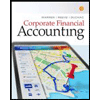
Intermediate Accounting, 10 Ed
10th Edition
ISBN: 9781260310177
Author: Mark W. Nelson, Wayne B. Thomas J. David Spiceland
Publisher: McGraw-Hill Education
expand_more
expand_more
format_list_bulleted
Concept explainers
Textbook Question
Chapter 2, Problem 2.18Q
[Based on Appendix A] What is the purpose of a worksheet? In a columnar worksheet similar to Illustration 2A–1, what would be the result of incorrectly transferring the balance in a liability account to column K, the credit column under income statement?
Expert Solution & Answer
Want to see the full answer?
Check out a sample textbook solution
Students have asked these similar questions
General accounting
Please provide correct answer
How much overhead should be applied to job no B12 ? General accounting
Chapter 2 Solutions
Intermediate Accounting, 10 Ed
Ch. 2 - Explain the difference between external events and...Ch. 2 - Each economic event or transaction will have a...Ch. 2 - What is the purpose of a journal? What is the...Ch. 2 - Explain the difference between permanent accounts...Ch. 2 - Describe how debits and credits affect assets,...Ch. 2 - Describe how debits and credits affect temporary...Ch. 2 - What is the first step in the accounting...Ch. 2 - Prob. 2.8QCh. 2 - Prob. 2.9QCh. 2 - Prob. 2.10Q
Ch. 2 - What is an unadjusted trial balance? An adjusted...Ch. 2 - Define adjusting entries and discuss their...Ch. 2 - Define closing entries and their purpose.Ch. 2 - Define prepaid expenses and provide at least two...Ch. 2 - Deferred revenues represent liabilities recorded...Ch. 2 - Define accrued liabilities. What adjusting journal...Ch. 2 - Prob. 2.17QCh. 2 - [Based on Appendix A] What is the purpose of a...Ch. 2 - [Based on Appendix B] Define reversing entries and...Ch. 2 - [Based on Appendix C] What is the purpose of...Ch. 2 - Prob. 2.21QCh. 2 - Transaction analysis LO21 The Marchetti Soup...Ch. 2 - Journal entries LO22 Prepare journal entries for...Ch. 2 - Prob. 2.3BECh. 2 - Journal entries LO22 Prepare journal entries for...Ch. 2 - Adjusting entries LO25 Prepare the necessary...Ch. 2 - Adjusting entries; income determination LO24,...Ch. 2 - Prob. 2.12BECh. 2 - Journal entries LO22 Prepare journal entries to...Ch. 2 - T-accounts and trial balance LO23 Post the...Ch. 2 - Prob. 2.5ECh. 2 - Debits and credits LO22 Indicate whether a debit...Ch. 2 - Prob. 2.7ECh. 2 - Prob. 2.8ECh. 2 - Reversing entries Appendix 2B The employees of...Ch. 2 - Special journals Appendix 2C The White Companys...Ch. 2 - Prob. 2.24ECh. 2 - Prob. 2.3PCh. 2 - Prob. 2.4PCh. 2 - Prob. 2.8PCh. 2 - Prob. 2.12PCh. 2 - Judgment Case 21 Cash versus accrual accounting;...Ch. 2 - Communication Case 23 Adjusting entries LO24 I...Ch. 2 - Prob. 2.1DA
Knowledge Booster
Learn more about
Need a deep-dive on the concept behind this application? Look no further. Learn more about this topic, accounting and related others by exploring similar questions and additional content below.Similar questions
- The company would record the cost of the equipment at?arrow_forwardShital Industries has a standard cost system in which it applies manufacturing overhead to products on the basis of standard machine-hours (MHs) at $6.50 per MH. During the month, the actual total variable manufacturing overhead was $39,600, and the actual level of activity for the period was 6,200 MHs. What was the variable overhead rate variance for the month?helparrow_forwardPasadena Candle Incarrow_forward
- Financial Accountingarrow_forwardDo fast this question answer general Accountingarrow_forwardAxay Corporation had an average days sales outstanding (DSO) period of 22 days in 2022. An analyst predicts that Axay’s DSO will decline in 2023 (due to expected improvements in the company's collections process) to match the industry average of 18 days. Total sales (all on credit) in 2022 were $350 million, and Axay expects total credit sales to increase to $380 million in 2023. To achieve the lower DSO, the change in the average accounts receivable balance from 2022 to 2023 that must occur is closest to: a) -$3.90 million b) -$2.36 million c) $2.85 million d) $3.90 million provide answerarrow_forward
arrow_back_ios
SEE MORE QUESTIONS
arrow_forward_ios
Recommended textbooks for you
- Principles of Accounting Volume 1AccountingISBN:9781947172685Author:OpenStaxPublisher:OpenStax CollegeCentury 21 Accounting Multicolumn JournalAccountingISBN:9781337679503Author:GilbertsonPublisher:Cengage
 Intermediate Financial Management (MindTap Course...FinanceISBN:9781337395083Author:Eugene F. Brigham, Phillip R. DavesPublisher:Cengage Learning
Intermediate Financial Management (MindTap Course...FinanceISBN:9781337395083Author:Eugene F. Brigham, Phillip R. DavesPublisher:Cengage Learning Corporate Financial AccountingAccountingISBN:9781305653535Author:Carl Warren, James M. Reeve, Jonathan DuchacPublisher:Cengage Learning
Corporate Financial AccountingAccountingISBN:9781305653535Author:Carl Warren, James M. Reeve, Jonathan DuchacPublisher:Cengage Learning

Principles of Accounting Volume 1
Accounting
ISBN:9781947172685
Author:OpenStax
Publisher:OpenStax College

Century 21 Accounting Multicolumn Journal
Accounting
ISBN:9781337679503
Author:Gilbertson
Publisher:Cengage


Intermediate Financial Management (MindTap Course...
Finance
ISBN:9781337395083
Author:Eugene F. Brigham, Phillip R. Daves
Publisher:Cengage Learning


Corporate Financial Accounting
Accounting
ISBN:9781305653535
Author:Carl Warren, James M. Reeve, Jonathan Duchac
Publisher:Cengage Learning
The accounting cycle; Author: Alanis Business academy;https://www.youtube.com/watch?v=XTspj8CtzPk;License: Standard YouTube License, CC-BY